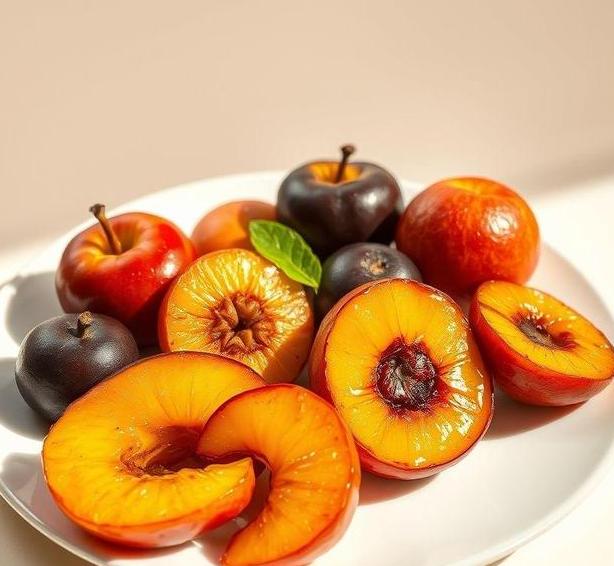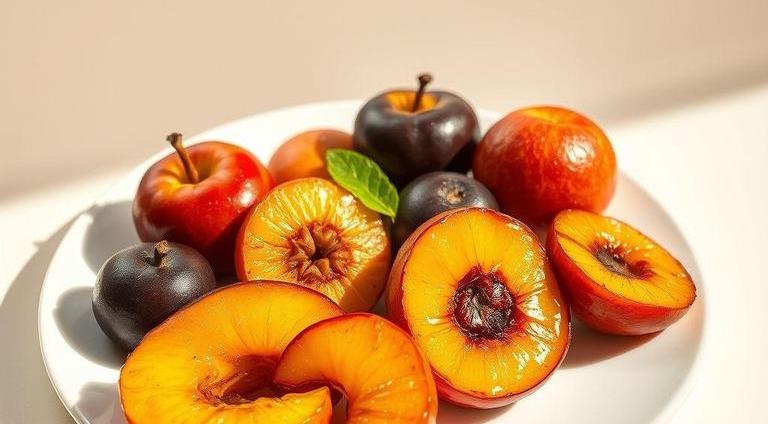Cooked fruit-a delicious and versatile ingredient in both sweet and savory dishes-has long been a favorite in kitchens worldwide. Whether it’s used in pies, jams, compotes, or simply as a warm topping for pancakes or yogurt, the transformation of raw fruit into a cooked, soft, and flavorful version is something that has captured the hearts and palates of many. But just like any other perishable food, cooked fruit has a shelf life, and knowing how long it lasts, how to store it, and the signs it may have gone bad is essential to avoid wasting food or potentially consuming something harmful.
In this article, we will dive into everything you need to know about cooked fruit, including how to recognize spoilage, how long it stays good, and how to store it properly to maximize its freshness.
So, let’s get to it, shall we?
Can Cooked Fruit Go Bad?
Short answer: Yes, cooked fruit can go bad, and it can spoil in a variety of ways, depending on factors like the cooking method, storage conditions, and how long it’s been sitting around.
Here’s why: When fruit is cooked, it becomes softer, releases sugars, and breaks down its structure. These changes can make it more prone to spoilage. The high moisture content, especially if it’s been combined with water or juice, provides a perfect environment for bacteria, molds, and yeasts to thrive. Even if your fruit is safe to eat right after it’s cooked, this balance can shift over time, and that’s when spoilage occurs.
So, when you store your cooked fruit improperly or keep it for too long, it can develop signs of degradation, from a change in texture or color to an unpleasant smell or taste.
Shelf Life For Cooked Fruit

The shelf life of cooked fruit varies based on a few factors-most notably, how you store it. Here’s a breakdown of what you can expect:
- Room Temperature: Cooked fruit should not be kept at room temperature for more than 2 hours. This is because bacteria can start to grow quickly when food is left in the “danger zone” (between 40°F and 140°F). If you know you won’t be eating it within that time frame, it’s best to refrigerate it right away.
- In the Refrigerator: When stored properly in an airtight container, cooked fruit will typically last between 3 to 5 days in the fridge. This is the optimal storage time for freshness and flavor retention.
- In the Freezer: If you want to extend the shelf life of cooked fruit, freezing is your best option. Cooked fruit can last up to 6 to 12 months when stored in a freezer-safe container or bag. However, the texture may change once thawed-some fruits become mushier after freezing, which can be great for sauces or smoothies but less ideal for fruit salads.
Common Signs Of Spoilage
It’s always good to know how to tell when your cooked fruit has gone bad. Here are some common signs to look out for:
- Off Smell: The first and most obvious sign of spoiled fruit is a sour, rotten, or fermenting odor. If it smells “off”, then it’s probably time to toss it.
- Mold: If you notice any fuzzy, green, or white spots on the fruit, this is mold. Mold can grow on the surface of cooked fruit, especially if it’s been stored improperly or for too long.
- Color Change: A significant shift in color, particularly if the fruit turns brown, gray, or mushy, can be a sign of spoilage. While some discoloration is normal, particularly in fruits like apples or pears, an extreme change indicates the fruit is past its prime.
- Soggy or Slimy Texture: Cooked fruit should remain soft but not overly slimy. If it has become excessively watery or slimy, it’s likely gone bad.
- Unpleasant Taste: If everything else seems fine but the fruit tastes off-sour, rancid, or overly fermented-it’s a strong indicator it should be discarded.
How To Store Cooked Fruit?

Proper storage is key to maintaining the freshness and longevity of your cooked fruit. Here are the best practices for keeping your cooked fruit in top condition:
- Cool it Down Quickly: After cooking, let your fruit cool down at room temperature for about 30 minutes before transferring it to the fridge or freezer. This prevents condensation from forming inside containers, which can encourage mold growth.
- Airtight Containers: Always use airtight containers or resealable bags when storing cooked fruit. This helps to keep out moisture and contaminants, preventing spoilage and preserving the fruit’s flavor.
- Label and Date: If you’re freezing cooked fruit, make sure to label the container with the type of fruit and the date it was cooked. This helps you track its age and ensures you’re consuming it before it reaches the 6-12 month mark.
- Store in Smaller Portions: When freezing, divide your cooked fruit into smaller portions. This way, you can defrost only what you need and avoid repeated freezing and thawing, which can degrade the quality.
-
Refrigeration And Freezing Tips
- If you’ve cooked fruit with added sugar (like a compote or jam), it may last a bit longer due to the preservative effect of sugar. However, don’t push the limits.
- If you’re freezing fruit, consider placing the fruit on a baking sheet in a single layer before transferring to the bag or container. This prevents pieces from sticking together.
Expert Tips
To ensure your cooked fruit remains safe and tasty for as long as possible, keep these expert tips in mind:
- Citrus as a Preservative: Adding a bit of lemon juice or lime juice can help preserve the color and freshness of your cooked fruit, particularly for fruits like apples, peaches, and pears that tend to brown quickly.
- Sugar and Acid: The addition of sugar (in jams or preserves) or acid (like lemon juice) can also help extend the shelf life of your cooked fruit by creating an inhospitable environment for bacteria.
- Freezing Considerations: Some fruits, like strawberries or peaches, can lose their shape and texture when frozen. If this is the case for your cooked fruit, think about turning it into a sauce or puree before freezing to maintain the best texture.
- Don’t Store with Raw Fruit: Cooked fruit and raw fruit should not be stored together. Raw fruit releases ethylene gas, which can cause the cooked fruit to ripen and spoil more quickly.
- Use Leftovers in Other Dishes: If you have leftover cooked fruit that’s approaching its spoilage date, you can repurpose it into smoothies, fruit sauces, or incorporate it into baked goods like muffins or cakes.
FAQs
Can Cooked Fruit Go Bad If Left Out At Room Temperature?
Yes, cooked fruit can go bad if left out at room temperature for too long. Perishable food should not be left out for more than two hours. After this time, bacteria can begin to grow, which can lead to foodborne illnesses.
How Long Does Cooked Fruit Last In The Fridge?
Cooked fruit typically lasts between 3 to 7 days in the fridge, depending on the type of fruit and how well it’s stored. It’s important to store cooked fruit in an airtight container to preserve freshness.
Can I Freeze Cooked Fruit To Extend Its Shelf Life?
Yes, freezing cooked fruit is an effective way to extend its shelf life. When properly stored in a freezer-safe container or bag, cooked fruit can last up to 6 months in the freezer. However, the texture may change once thawed.
How Can I Tell If Cooked Fruit Has Gone Bad?
Signs that cooked fruit has gone bad include off smells, changes in color, mold growth, or an overly soft or mushy texture. If the fruit has a sour or fermented smell, it should be discarded.
Does Cooked Fruit Spoil Faster Than Raw Fruit?
Cooked fruit tends to spoil faster than raw fruit because the heat from cooking can break down its cell structure, making it more susceptible to bacteria and mold growth. However, proper storage can help extend its shelf life.
Can Cooked Fruit Be Safely Reheated?
Yes, cooked fruit can be safely reheated, but it should be done thoroughly to prevent foodborne illness. Reheat it to at least 165°F (74°C) to ensure safety. Repeated reheating, however, may affect the texture and flavor.
What Happens If I Eat Cooked Fruit That’s Gone Bad?
Eating cooked fruit that’s gone bad can result in food poisoning or stomach upset due to bacteria such as E. coli, Salmonella, or Listeria. Symptoms may include nausea, vomiting, diarrhea, and stomach cramps.
Can I Store Cooked Fruit With Sugar To Preserve It Longer?
Adding sugar to cooked fruit can help preserve it longer, as sugar acts as a preservative by reducing the moisture available for bacterial growth. However, it’s still important to refrigerate or freeze the fruit to prevent spoilage.
How Should I Store Cooked Fruit To Prevent Spoilage?
To prevent spoilage, cooked fruit should be stored in an airtight container in the fridge or freezer. If refrigerating, make sure the container is sealed tightly to prevent contamination. If freezing, consider portioning the fruit for easy use later.
Is It Safe To Eat Cooked Fruit After A Week In The Fridge?
It depends on the type of fruit and how it was stored. Most cooked fruit should be consumed within 3 to 7 days of being refrigerated. After a week, it’s safer to discard it to avoid the risk of foodborne illness.